By Rocio Granados - La Voz Catolica
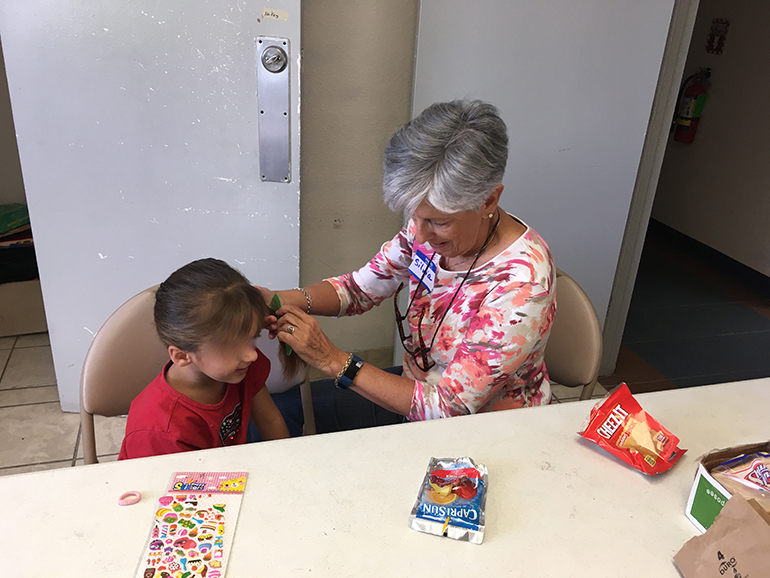
Photographer: Courtesy of Silvia Munoz
Silvia Muñoz, director of social action for the Jesuits’ Pedro Arrupe Institute in Miami, combs the hair of a child who arrived at the Casa Oscar Romero shelter in El Paso, Texas, with her father. Muñoz spent two weeks in March volunteering at the shelter.
MIAMI | Silvia Muñoz never imagined that helping people arriving at the U.S. border with Mexico would trigger memories of one of the most painful moments of her life.
Muñoz, director of social action for the Jesuits’ Pedro Arrupe Institute in Miami, spent two weeks this March volunteering at Casa Oscar Romero in El Paso, Texas. It’s a shelter for asylum seekers who have been processed and released by ICE — Immigrations and Customs Enforcement — while they await a legal hearing to determine whether they can stay in this country.
As soon as she arrived at the shelter, Muñoz got to work. A busload of about 30 immigrants had just arrived and they needed clothes, food, medical care, showers and rest.
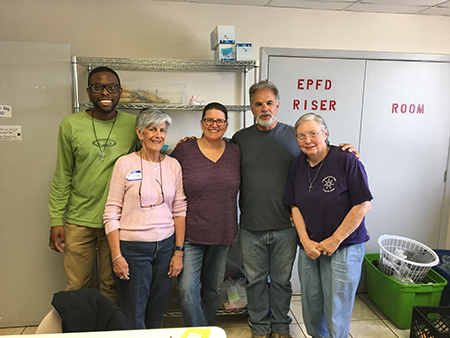
Photographer: Courtesy of Silvia Munoz
Silvia Muñoz, director of social action for the Jesuits’ Pedro Arrupe Institute in Miami, poses with other volunteers who worked with her at the Casa Oscar Romero shelter in El Paso, Texas, last March. From left: Reynaldo, a Jesuit novice; Muñoz; Laura; Barry; and Sister Mary Catherine Sack of the Congregation of St. Joseph in Wichita, Kansas.
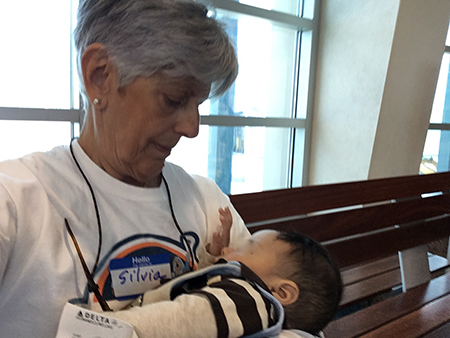
Photographer: Courtesy of Silvia Munoz
Silvia Muñoz, director of social action for the Jesuits’ Pedro Arrupe Institute in Miami, holds a child while the mother shows her papers to TSA officials. During her two weeks as a volunteer at an El Paso, Texas, shelter, Muñoz would accompany immigrants to the airport once they obtained the airfare to reunite with family members or sponsors in the U.S.
The volunteers provide all that in addition to gathering personal information to help the immigrants contact relatives or sponsors in the U.S. Family members or sponsors are asked to provide air or bus fare so the new arrivals can join them. Volunteers also accompany the immigrants to the bus terminal or airport so they can make their flights, since many of them have never been on a plane.
Leaving them at the airport “broke my heart,” said Muñoz, recalling the fear in the faces of many of the people, who did not know how to read in Spanish, let alone in English. But she had to leave them at security, with no phone and no money, only a bag of food.
“It’s like saying goodbye to a loved one,” she recalled, even though they were people she had just met. “I felt a knot in my heart and when I came down the stairs I would start crying.”
Her fourth time at the airport triggered a memory from 60 years ago. She flashed back to herself as a 14-year-old at the airport in Havana, Cuba, saying goodbye to her parents. They were sending her alone to the U.S. to protect them from the Communist regime that had installed itself on the island.
“I was on one side of what we called the ‘pecera’ (fishbowl, a glass enclosure) and my parents were on the other,” Muñoz recalled. She then realized why those farewells in El Paso were affecting her so much.
Muñoz associated her own flight from her homeland with what’s happening right now with the parents and children walking through Central America to get to the U.S. Although she was not one of them, she also connected today’s experience with that of the 14,000 “Pedro Pan” children, who came from Cuba to the U.S. as unaccompanied minors through a program organized by the Catholic Church in Miami.
“Our parents did exactly the same thing. How many Cubans launched themselves on boats and drowned in the process? And why? Because they were desperate. It’s the same thing,” Muñoz said.
“It hurts me to hear my fellow Cubans, especially those who left via Pedro Pan, those of us who left by ourselves, (say) they don’t understand why these parents are doing this. They call it abuse, saying they are using the children to be able to get into the U.S.”
Muñoz said there’s a simple reason why immigrants from Central America are risking the lives of their children today. “Because they are fleeing horrible situations. Nobody leaves their country, especially walking for miles, on a whim. They leave because they have no way of earning a living, because they are being threatened and their governments are not protecting them from thieves, from drugs, from multinationals that take their lands and then don’t give them work. Central America is living through a horrible situation. How are we going to fix it? That’s what worries me.”
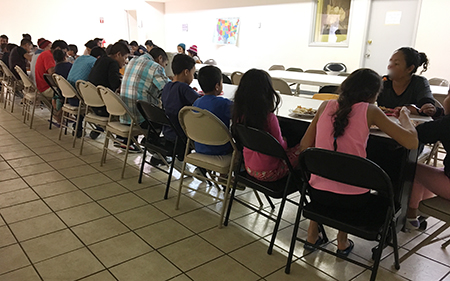
Photographer: Courtesy of Silvia Munoz
A group of newly arrived immigrants eat a hot meal at the Casa Oscar Romero shelter in El Paso, Texas, after being processed and released by Immigration and Customs Enforcement last March.
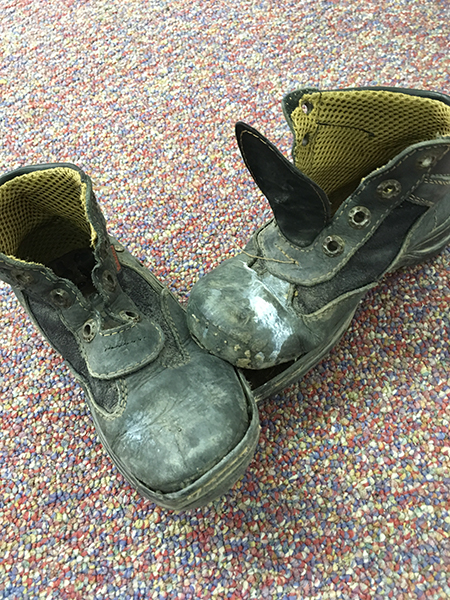
Photographer: Courtesy of Silvia Munoz
During her two-week stay at the Casa Oscar Romero shelter in El Paso, Texas, volunteer Silvia Muñoz took a picture of the shoes of a child who walked to the U.S. border from Central America with his parents.
She doesn’t have the answer, she said, but she is convinced that “if we don’t help to fix the situation in those countries, this is not going to stop. They are going to keep coming because they have no other way out. They have to survive, and they are trying to save their children first.”
Muñoz said during the 16 days she spent at the Casa Oscar Romero shelter “I think I did everything,” from taking down people’s information to calling their families, preparing hundreds of peanut butter and jelly sandwiches, sorting clothes, cleaning bathrooms, helping with laundry, and filling bags with personal hygiene items such as soap and toothbrushes. She also organized the diaper closet, distributed medicine and gave first aid when no doctor or nurse was present at the shelter’s clinic.
She praised the work and generosity of other volunteers, such as a young man with cancer who took two weeks between treatments to help people who are neither from his country nor speak his mother tongue. She said she was saddened to realize that she was the only Hispanic volunteer during her whole time there.
The volunteers come from all faiths, although the majority are Catholic and women religious. The shelter regularly received groups of Mormon missionaries, people from Protestant churches and people who live in El Paso. All were willing to help in whatever way they could.
She said the work at the shelter is intense. Around 10 volunteers tend daily to an average of 120 immigrants. But the immigrants themselves help by doing everything they are asked to do.
Most of them — around 70 percent — are from Guatemala, and most of them are indigenous people who don’t speak Spanish very well. She also saw immigrants from Honduras and El Salvador, small groups from Brazil, some Cubans and Nicaraguans. All of them had children, and one or two barely had clothes for them.
“I would say, ‘God is here,’ because when something was needed, whatever we needed would come,” Muñoz said.
She said the stories she heard from the immigrants at Casa Oscar Romero affected her deeply and she can’t stop thinking about them.
“This experience has changed me completely. Seeing the people face to face affected me,” Muñoz said, adding, “I have met Christ crucified and I’m glad this happened during Lent because it has been the most profoundly lived Lent of my life.”
ABOUT CASA OSCAR ROMERO
- After being detained and processed by ICE, asylum seekers are taken to shelters run by religious and charitable institutions such as Casa Oscar Romero. It is one of many border shelters operated by Annunciation House.
- Annunciation House is a non-profit started 40 years ago by a group of young people who sought to live out their faith by helping immigrants. It receives no government funds and sustains itself through donations, “but it has a contract with the government so that no immigrants will sleep on the streets,” said Silvia Muñoz, the Miami volunteer who spent two weeks at Casa Oscar Romero in March.
- Annunciation House has opened shelters in various places in El Paso: schools, convents, Catholic and Protestant churches and even cheap hotels where they rent out entire floors.
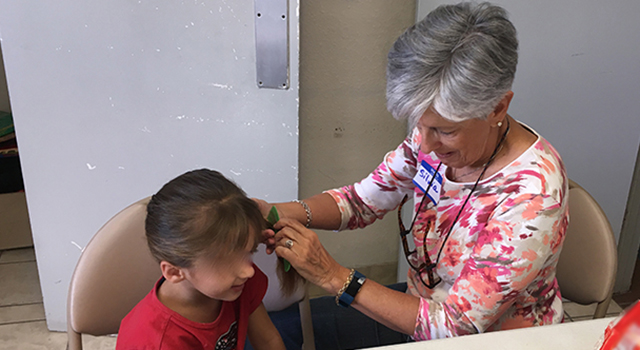

Comments from readers